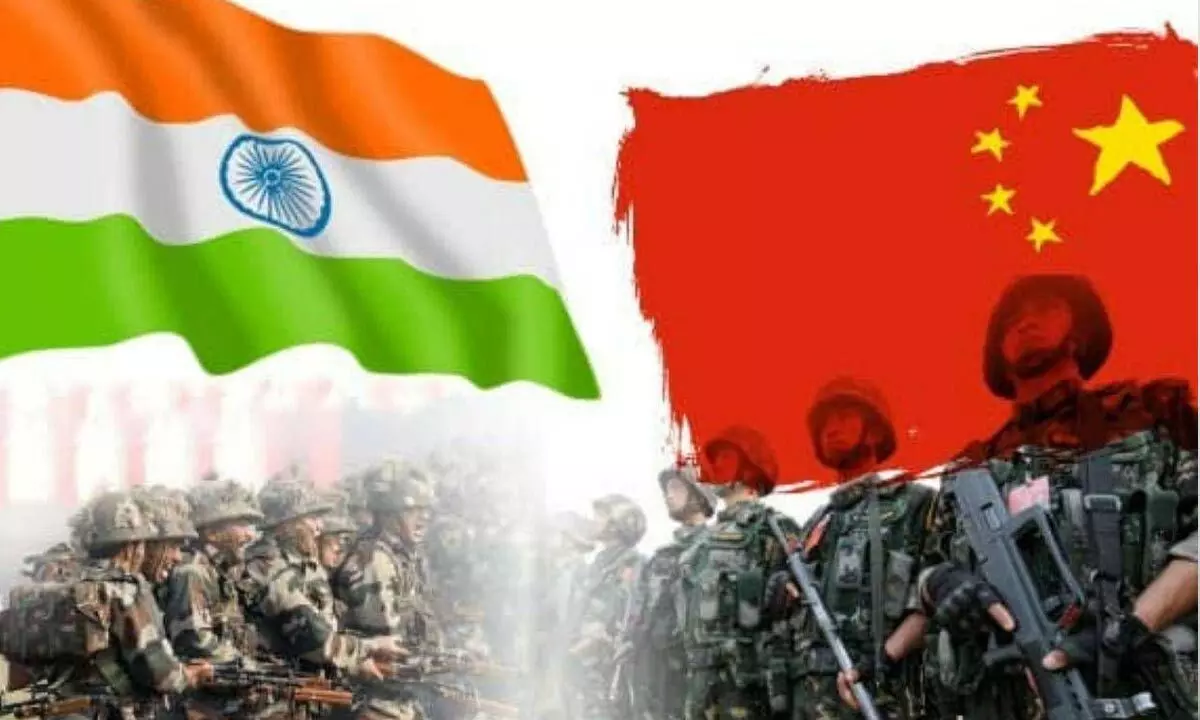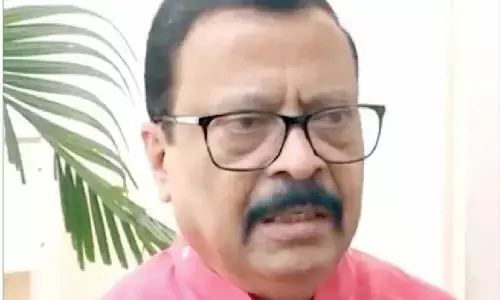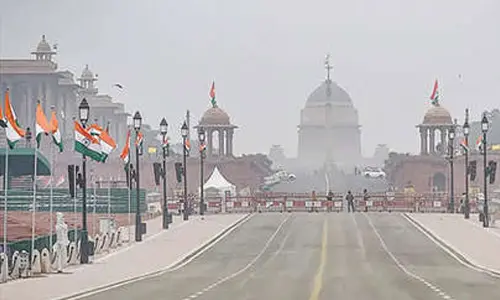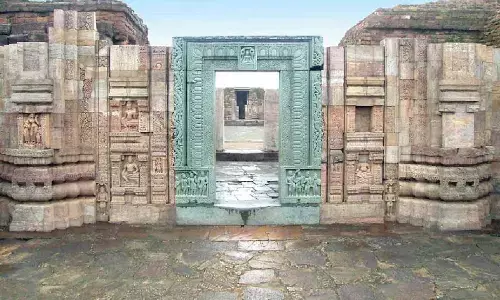Shun politics, time to be pragmatic

Shun politics, time to be pragmatic
The undemarcated border between India and China is said to be around 3,488 km and there are over 25 points of dispute.
The undemarcated border between India and China is said to be around 3,488 km and there are over 25 points of dispute. Relations between India and China have been worsening. The two world powers are facing off against each other along their disputed border in the Himalayan region.
According to a podcast with ANI, the former chief of Indian Army, General Manoj Mukund Naravane, has said that China's attempts to change the status quo along the Line of Actual Control (LAC) by resorting to "salami slicing" tactics have led to a "more assertive response from the Indian Army." He said the Chinese army has been trying to alter the status quo along the LAC in very "small incremental steps."
If we dig a little into the history, India and China fought a major war in October-November 1962 in the Himalayas over their contested border, which culminated in India losing some 45,000 square kilometres of territory in Ladakh. Politicians! Please do not forget this aspect before you politicise the issue of recent clash between the two sides in Arunachal Pradesh.
In the 60 years since that war, relations have improved thanks to diplomatic measures taken by successive governments and a series of meetings between the army heads near the notional LAC. The two countries built robust economic ties and engaged in several rounds of negotiations that resulted in agreements on confidence-building measures and steps forward to resolve their border dispute. Yet, the border running through an inhospitable and uninhabited terrain remains unsettled.
There is a saying that Chinese war strategy is "two steps forward and one step backward" so that in the process they gain one step. The border issue is a very sensitive issue and as a country all political parties need to exhibit extreme caution and highest level of maturity before they speak or protest.
The misfortune is that our political parties and leaders look upon every issue as a means to score over one another and in the process make a mess of everything. I have no doubt that they would even use this as an issue during the general elections whenever they are held, forgetting the fact that India is much more capable militarily. Our leaders need to be more sensitive to issues pertaining to national security and the armed forces. Maybe, sending the politicians in their normal attire to the border areas will give them a real feel of the adverse conditions in which the army has to be alert, agile and defend our borders. Handling border issues is not as easy as exhibiting one's lung power during public meetings or in the legislatures. It needs to be effectively handled at the ground level and at the diplomatic level. Issues like national security and border issues should be kept away from politics.
It is not sufficient to say, "We are one with the nation on the issues of national security and would not like to politicize it." Words should be converted into practice. While claiming to be one with government, they say, "No one is bigger than the country, but Modiji is putting the country in danger to save his image."
Another example of politicising the issue is Rahul Gandhi's comment accusing Narendra Modi's government of "giving 1,000 sq km and 390 sq miles of territory to China without a fight." He said earlier, "our concern was about Chinese incursions only but now the situation is more worrying as our government is giving up our land happily." He said, "If India's approach remains the same, we are going to lose more land." We have also seen some comments made by former J&K Chief Minister and PDP leader Mehbooba Mufti. It is time our leaders learn to show some restraint regarding the issues related to border. Such an irresponsible attitude is not expected from leaders. Why doesn't the Congress condemn the Chinese openly? Why can't they pose questions to China? It also tweeted a video of Prime Minister Narendra Modi's speech made after the Galwan clash in which he had said that "no one occupied our land and no one has entered India and that none of our posts is in occupation of anyone else". "If this mistake had not been made, had China been named, it would not have dared to raise its eyes towards India... There's still time... don't be afraid," the Congress said, while referring to the Prime Minister's speech. What is this, if not politicising?
The political parties should once google and see how foreign media had reacted to India-China face-off at Galwan. They said it was a perilous attack but were cautious in their comments. Even that kind of caution our politicians do not show. On the other hand, these days everyone gives a lecture on how media should report and what journalism is. It is these very leaders who talk of democracy but do not bat an eyelid before sending legal notices on frivolous grounds to media. This kind of intolerance towards media was never seen even during the period of Indira Gandhi except when she imposed emergency. They should first question themselves about their activities, their expertise and their background.
The face-off between China and India is not new. Criticism of those in power regarding Indo-China clashes is also not new. The Congress party should understand that clashes between the two sides did take place many times after the 1962 Indo-China war. A lot can be talked about the circumstances that led to the 1962 war, how the then government led by Jawaharlal Nehru handled it and the kind of humiliating defeat we suffered.
But all that would not serve any purpose. Some even say that many of the leaders who keep making comments on such sensitive issues do not even know what exactly the terrain is, what the weather conditions there are and what the Line of Actual Control is. Just because the LAC has become a common usage, they keep making noise.
The BBC in one of its reports had said the 3,440km (2,100-mile)-long disputed border has rivers, lakes and snow caps along the frontier. This means the line can shift, bringing soldiers face to face at many point or points, sparking a confrontation. Why do the attacks take place? It is because China wants to encroach upon our land and because both nations are vying with each other to build infrastructure along the border. India's construction of a new road to a high-altitude air base is seen as one of the main triggers for a deadly 2020 clash with Chinese troops.
Despite talks at the diplomatic and military level, there is no let-up in the tensions and recently both sides clashed with each other near Tawang sector of Arunachal Pradesh which is the eastern tip of India – after a lull of over one year. Some soldiers suffered minor injuries. In 2020 June we saw how the troops of both sides fought with sticks and clubs, not guns, in Galwan valley. As many as 20 Indian soldiers and four Chinese soldiers became martyrs. This was the first major confrontation between Indian and Chinese soldiers after 1975.
Certainly, the simmering tensions are not a healthy situation. Both the countries on one hand are biggest trading partners and on the other the clashes between the two sides run the risk of getting escalated anytime which may prove to be devastating since both the countries are now well-known nuclear powers. The best way forward is bilateral talks.
The Indian government certainly should take the main opposition into confidence. There can be no difference on this issue. But the opposition, too, should not jump the gun and come up with all kinds of statements immediately after an incident happens. Maybe, the Central government should consider having a special Parliamentary committee where such issues can be discussed and the government can give all necessary details. Once it is discussed in the committee, both the government and the opposition should come out with a joint statement and should not cross the Laxman Rekha thereafter.
The Modi government should focus its attention on devising ways to see that both the ruling party and the opposition are really on the same page in such situations and together they need to send out a message that no nonsense from across border would be tolerated at any cost.










